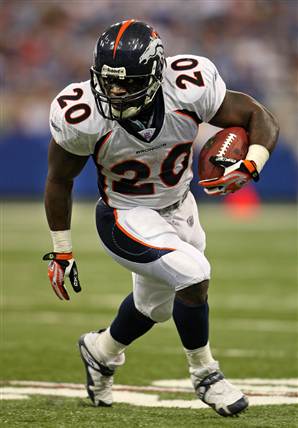Following a lengthy battle, including a hearing in federal court, Travis Henry won his battle and was not suspended. During this battle and of his own accord, Henry took a lie-detector test and submitted a hair sample to prove his innocence. The reason for the appeal in court was that an expert of the player's choosing was not present during the league's test of his sample. This all happened over a week ago, so you're probably wondering why I think it's still relevant. The relevance is hidden in the details of the decision and the league's actions, and the major media outlets (ESPN and CNNSI) paid no attention.
Most major sports leagues which have drug policies exercise a dictatorship over the process and its results, and the players' appeals are usually fruitless. No better example of this exists than the Floyd Landis case. Floyd spent millions of dollars over more than a year to demonstrate that the lab had conducted the test incorrectly, and in spite of gross errors noted in the final decision, he was still found guilty. There are other examples as well, but I don't know of any in which a player has been able to overturn a guilty decision when appealing based on problems with the test, testers, or testing procedure. This leads to the critical question: "How can an athlete prove his/her innocence if falsely accused?"
"The defense of hair samples and lie detector tests was irrelevant and unconvincing," said League spokeman Greg Aiello. And to further squelch the concept, Mike Shanahan was fined for mentioning his belief in Henry after the two tests came back negative. So I might be able to accept that the tests were "irrelevant" since the appeal was primarily based on the presence of the expert, but "unconvincing"? That was directly intended to establish that players could not perform tests to show their innocence (regardless of the validity of the tests), and by the way, coaches and players aren't allowed to comment about it or they'll be fined. I understand playing in the NFL is a privilege, and every player should be above suspicion. But no test is perfect. Assuming 50 players on 32 teams, that's 1600 players to test. If 99.9% of the test's positives are correct, that's still 1 or 2 false positives every year, and I would bet that with human error, depending on the test, 99.9% is optimistic. Plus, each player is subjected to multiple tests since many different substances are banned.
What can a player do if there's a false positive? So many people have tried the "I'm innocent!" cry wolf defense that no one buys that any more. But they can't perform their own tests because those are "unconvincing". When the first offense is 4 games and close to 1/4 of the year's salary, a false positive is a big deal. And this doesn't even get into conspiracy theories about the French lab that does all the cycling tests.
In a country that believes in innocent until proven guilty, with so much money and public respect (think slander/libel) at stake, players deserve a manner by which to defend themselves. If they do not have one, we are one corrupt commissioner or lab away from the Salem witchcraft trials or McCarthy's Red scare in the '50s.
The presence of an expert (not guaranteed in all sports) prevents this to some extent, but the false positive problem must be addressed. No test is perfect, but we treat them as if they are. For cycling, where teams pull out of the Tour after a positive test, a false positive is even more damaging. It's time for cooler heads to prevail, with a reasonable system including some sort of check on the currently unlimited power of the League office and its equivalents.

2 Responses:
I love when law degrees meet blogging. Good times.
Nope, that was the engineer.
Drug testing doesn't fit well into the typical Type I (false positive) and Type II (false negative) framework, but I am willing to accept that over the course of X years we should EXPECT a false positive in the drug testing of so many players.
That being said, I initially thought Travis Henry was crying wolf. I started to change my mind when he didn't just say he was innocent, but rather took steps to prove his innocence. It's not fair for a player to have to exculpate himself, and that's why I agree that a positive urine test should be confirmed with a positive hair sample. That would not overly complicate the process, though it might for steroids.
We do need to remember that this is not a criminal proceeding governed by the constitution. It's a part of a process that was thoroughly and fairly negotiated in the collective bargaining agreement. Before we blame only the league, we need to remember that the league is not going to do anything that weakens any of the league-friendly provisions in the CBA. The NFLPA earns some blame for not negotiating a confirmation mechanism.
Post a Comment